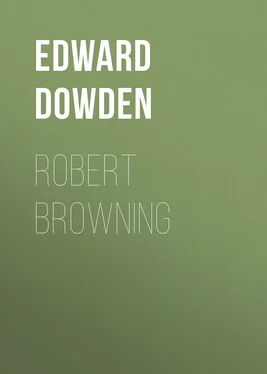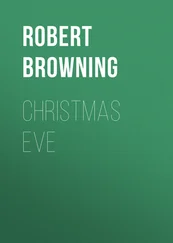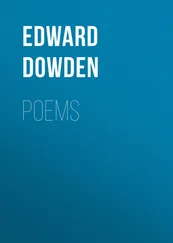Edward Dowden - Robert Browning
Здесь есть возможность читать онлайн «Edward Dowden - Robert Browning» — ознакомительный отрывок электронной книги совершенно бесплатно, а после прочтения отрывка купить полную версию. В некоторых случаях можно слушать аудио, скачать через торрент в формате fb2 и присутствует краткое содержание. Жанр: Биографии и Мемуары, Поэзия, foreign_antique, foreign_prose, foreign_poetry, на английском языке. Описание произведения, (предисловие) а так же отзывы посетителей доступны на портале библиотеки ЛибКат.
- Название:Robert Browning
- Автор:
- Жанр:
- Год:неизвестен
- ISBN:нет данных
- Рейтинг книги:5 / 5. Голосов: 1
-
Избранное:Добавить в избранное
- Отзывы:
-
Ваша оценка:
- 100
- 1
- 2
- 3
- 4
- 5
Robert Browning: краткое содержание, описание и аннотация
Предлагаем к чтению аннотацию, описание, краткое содержание или предисловие (зависит от того, что написал сам автор книги «Robert Browning»). Если вы не нашли необходимую информацию о книге — напишите в комментариях, мы постараемся отыскать её.
Robert Browning — читать онлайн ознакомительный отрывок
Ниже представлен текст книги, разбитый по страницам. Система сохранения места последней прочитанной страницы, позволяет с удобством читать онлайн бесплатно книгу «Robert Browning», без необходимости каждый раз заново искать на чём Вы остановились. Поставьте закладку, и сможете в любой момент перейти на страницу, на которой закончили чтение.
Интервал:
Закладка:
Such reduced to a colourless and abstract statement is the theme dealt with in Pauline . The young poet, who, through a fading autumn evening, lies upon his death-bed, has been faithless to his high calling, and yet never wholly faithless. As the pallid light declines, he studies his own soul, he reviews his past, he traces his wanderings from the way, and all has become clear. He has failed for the uses of earth; but he recognises in himself capacities and desires for which no adequate scope could ever have been found in this life; and restored to the spirit of love, of trust, by such love, such trust as he can give Pauline, he cannot deny the witnessing audible within his own heart to a future life which may redeem the balance of his temporal loss. The thought which plays so large a part in Browning's later poetry is already present and potent here.
Two incidents in the history of a soul—studied by the speaker under the wavering lights of his hectic malady and fluctuating moods of passion—are dealt with in a singularly interesting and original way. He describes, with strange and beautiful imagery, the cynical, bitter pleasure—few of us do not know it—which the intellectual faculties sometimes derive from mocking and drawing down to their own level the spiritual powers, the intuitive powers, which are higher than they, higher, yet less capable of justification or verification by the common tests of sense and understanding. The witchcraft of the brain degrades the god in us:
And then I was a young witch whose blue eyes,
As she stood naked by the river springs,
Drew down a god: I watched his radiant form
Growing less radiant, and it gladdened me.
What he presents with such intensity of imaginative power Browning must have known—even if it were but for moments—by experience. And again, there is impressive truth and originality in the description of the state of the poet's mind which succeeded the wreck of his early faith and early hopes inspired by the voice of Shelley—the revolutionary faith in liberty, equality and human perfectibility. Wordsworth in The Prelude —unpublished when Browning wrote Pauline —which is also the history of a poet's mind, has described his own experience of the loss of all these shining hopes and lofty abstractions, and the temper of mind which he describes is one of moral chaos and spiritual despair. The poet of Pauline turns from political and social abstractions to real life, and the touch of reality awakens him as if from a splendid dream; but his mood is not so sane as that of despair. He falls back, with a certain joy, upon the exercise of his inferior powers; he wakes suddenly and "without heart-wreck ":
First went my hopes of perfecting mankind,
Next—faith in them, and then in freedom's self
And virtue's self, then my own motives, ends,
And aims and loves, and human love went last.
I felt this no decay, because new powers
Rose as old feelings left—wit, mockery,
Light-heartedness; for I had oft been sad,
Mistrusting my resolves, but now I cast
Hope joyously away; I laughed and said
"No more of this!"
It is difficult to believe that Browning is wholly dramatic here; we seem to discover something of that period of Sturm und Drang , when his mood grew restless and aggressive. The homage paid to Shelley, whose higher influence Browning already perceived to be in large measure independent of his creed of revolution, has in it certainly something of the spirit of autobiography. In this enthusiastic admiration for Shelley there is nothing to regret, except the unhappy extravagance of the name "Suntreader," which he invented as a title for the poet of Alastor and Prometheus Unbound.
The attention of Mr W.J. Fox, a Unitarian minister of note, had been directed to Browning's early unpublished verse by Miss Flower. In the Monthly Repository (April 1833) which he then edited, Mr Fox wrote of Pauline with admiration, and Browning was duly grateful for this earliest public recognition of his genius as a poet. In the Athenaeum Allen Cunningham made an effort to be appreciative and sympathetic. John Stuart Mill desired to be the reviewer of Pauline in Taifs Magazine ; there, however, the poem had been already dismissed with one contemptuous phrase. It found few readers, but the admiration of one of these, who discovered Pauline many years later, was a sufficient compensation for the general indifference or neglect. "When Mr Browning was living in Florence, he received a letter from a young painter whose name was quite unknown to him, asking him whether he were the author of a poem called Pauline , which was somewhat in his manner, and which the writer had so greatly admired that he had transcribed the whole of it in the British Museum reading-room. The letter was signed D.G. Rossetti, and thus began Mr Browning's acquaintance with this eminent man." 14 14 Edmund Gosse: "Robert Browning Personalia," pp. 31, 32. Mr W. M. Rossetti in "D.G. Rossetti, his Family Letters," i. 115, gives the summer of 1850 as the date of his brother's letter; and says, no doubt correctly, that Browning was in Venice at the time. Mr Sharp prints a letter of Browning's on his early acquaintance with Rossetti, and on the incident recorded above. I may here note that "Richmond," appended, with a date, to Pauline , was a fancy or a blind; Browning never resided at Richmond.
Chapter II
Paracelsus and Sordello
There is little of incident in Browning's life to be recorded for the period between the publication of Pauline and the publication of Paracelsus . During the winter of 1833-1834 he spent three months in Russia, "nominally," says Mrs Orr, "in the character of secretary" to the Russian consul-general, Mr Benckhausen. Memories of the endless pine-forests through which he was driven on the way to St Petersburg may have contributed long afterwards to descriptive passages of Ivan Ivanovitch.
In 1842 or 1843 he wrote a drama in five acts to which was given the name "Only a Player-girl"; the manuscript lay for long in his portfolio and never saw the light. "It was Russian," he tells Miss Barrett, "and about a fair on the Neva, and booths and droshkies and fish-pies and so forth, with the Palaces in the background." 15 15 The supposition of Mr Sharp and Mr Gosse that Browning visited Italy after having seen St Petersburg is an error. His first visit to Italy was that of 1838. I may note here that in a letter to E.B.B. (vol. ii. 443) Browning refers to having been in Holland some ten years since; the date of his letter is August 18, 1846.
Late in life, at Venice, Browning became acquainted with an old Russian, Prince Gagarin, with whom he competed successfully for an hour in recalling folk-songs and national airs of Russia caught up during the visit of 1833-34. "His memory," said Gagarin, "is better than my own, on which I have hitherto piqued myself not a little." 16 16 Mrs Bronson; Browning in Venice. Cornhill Magazine , Feb. 1902. pp. 160, 161.
Perhaps it was his wanderings abroad that made Browning at this time desire further wanderings. He thought of a diplomatic career, and felt some regret when he failed to obtain an appointment for which he had applied in connection with a mission to Persia.
In the winter of 1834 Browning was at work on Paracelsus , which, after disappointments with other houses, was accepted, on terms that secured the publisher from risk, by Effingham Wilson, and appeared before midsummer of the following year. The subject had been suggested by Count Amédée de Ripert-Monclar, a young French royalist, engaged in secret service on behalf of the dethroned Bourbons. To him the poem is dedicated. For a befitting treatment of the story of Paracelsus special studies were necessary, and Browning entered into these with zeal, taking in his poem—as he himself believed—only trifling liberties with the matter of history. In solitary midnight walks he meditated his theme and its development. "There was, in particular," Mr Sharp tells us, "a wood near Dulwich, whither he was wont to go." Mr Sharp adds that at this time Browning composed much in the open air, and that "the glow of distant London" at night, with the thought of its multitudinous human life, was an inspiring influence. The sea which spoke to Browning with most expressive utterances was always the sea of humanity.
Читать дальшеИнтервал:
Закладка:
Похожие книги на «Robert Browning»
Представляем Вашему вниманию похожие книги на «Robert Browning» списком для выбора. Мы отобрали схожую по названию и смыслу литературу в надежде предоставить читателям больше вариантов отыскать новые, интересные, ещё непрочитанные произведения.
Обсуждение, отзывы о книге «Robert Browning» и просто собственные мнения читателей. Оставьте ваши комментарии, напишите, что Вы думаете о произведении, его смысле или главных героях. Укажите что конкретно понравилось, а что нет, и почему Вы так считаете.












